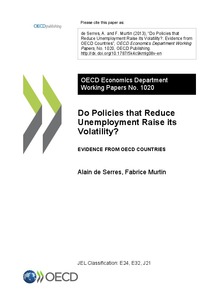Do policies that reduce unemploynment raise its volatility? Evidence from OECD countries

de Serres, Alain ; Murtin, Fabrice
Organisation for Economic Co-operation and Development, Paris
OECD Publishing - Paris
2013
31 p.
employment security ; labour legislation ; labour market reform ; unemployment ; labour market policy
Economics Department Working Papers
1020
Labour market
http://dx.doi.org/10.1787/5k4c9kmlg08v-en
English
Bibliogr.
"In this paper we examine whether past labour market reforms aiming at reducing the rate of unemployment have raised its long-run volatility. Using non-linear panel data models applied to 24 OECD countries between 1985 and 2007, as well as Monte-Carlo techniques, we do not find any evidence of such policy trade-off. In contrast, we find that reduced unemployment benefit duration, more competition-inducing product market regulation and looser employment protection legislation are associated with a weaker persistence of unemployment over time, which implies a lower volatility of unemployment in the long run. More specifically, the evidence suggests that even in the case of reforms that may have raised the shortterm sensitivity of unemployment to business cycles (such as with the easing of employment protection), the weaker persistence effect dominates the higher cyclical volatility, implying a net reduction in long-term volatility."
Digital
The ETUI is co-funded by the European Union. Views and opinions expressed are however those of the author(s) only and do not necessarily reflect those of the European Union or the ETUI.